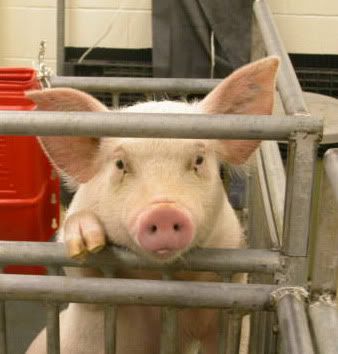
Swine Flu (old name) ---> Influenza A, H1N1 (new name)
1 May 2009 -- The situation continues to evolve rapidly. As of 06:00 GMT, 1 May 2009, 11 countries have officially reported 331 cases of influenza A(H1N1) infection.
The United States Government has reported 109 laboratory confirmed human cases, including one death. Mexico has reported 156 confirmed human cases of infection, including nine deaths.
The following countries have reported laboratory confirmed cases with no deaths - Austria (1), Canada (34), Germany (3), Israel (2), Netherlands (1), New Zealand (3), Spain (13), Switzerland (1) and the United Kingdom (8).
Further information on the situation will be available on the WHO website on a regular basis. WHO advises no restriction of regular travel or closure of borders. It is considered prudent for people who are ill to delay international travel and for people developing symptoms following international travel to seek medical attention, in line with guidance from national authorities.
There is also no risk of infection from this virus from consumption of well-cooked pork and pork products. Individuals are advised to wash hands thoroughly with soap and water on a regular basis and should seek medical attention if they develop any symptoms of influenza-like illness.
How can I protect myself from influenza A (H1N1)?
Practice general preventive measures for influenza:
* Avoid close contact with people who appear unwell and have fever and cough.
* Wash your hands with soap and water thoroughly and often.
* Practice good health habits including adequate sleep, eating nutritious food, and keeping physically active.
How do I care for an ill person at home?
* Separate the ill person from others, at least 1 meter in distance from others.
* Cover your mouth and nose when caring for the ill person. Either commercial or homemade materials are fine, as long as they are disposed of or cleaned properly after use.
* Wash your hands with soap and water thoroughly after each contact with the ill person.
* Improve the air flow where the ill person stays. Use doors and windows to take advantage of breezes.
* Keep the environment clean with readily available household cleaning agents.
If you are living in a country where there are infections follow additional advice from your national and local health authorities.
What should I do if I think I have the illness?
If you feel unwell, have high fever, cough or sore throat:
* Stay at home and keep away from work, school or crowds.
* Rest and take plenty of fluids.
* Cover your mouth and nose with disposable tissues when coughing and sneezing, and dispose of the used tissues properly.
* Wash your hands with soap and water often and thoroughly, especially after coughing or sneezing.
* Inform family and friends about your illness and try to avoid contact with people.
What should I do if I need medical attention?
* Contact your doctor or healthcare provider before travelling to a health facility, and report your symptoms. Explain why you think you have influenza A(H1N1) (for example, if you have recently travelled to a country where there is an outbreak in humans). Follow the advice given to you.
* If it is not possible to contact your healthcare provider in advance, communicate your suspicion of infection as soon as you arrive at the facility.
* Cover your nose and mouth during travel.
Source taken from WHO






No comments:
Post a Comment